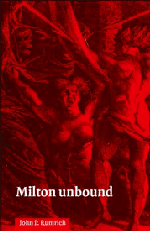2 - The question of context
Published online by Cambridge University Press: 30 September 2009
Summary
This power of generalizing gives men so much the superiority in mistake over the dumb animals.
George EliotHeads I win, tails I burn you alive.
William EmpsonThis chapter pursues a correlation between the tendency to depict Milton's art as if it were determinist in its premises and the agendas, methodologies, and interpretive strategies that Milton scholars have brought to bear on his work. Fundamental to my larger argument is the claim that Milton was a poet of indeterminacy who found ways to incorporate the uncertain and the evolving into his most highly realized works of literary art: a poetics of becoming. This chapter thus begins by appealing to a theory of communication that allows for indeterminacy, one that presents all communication, including literary art, as a means of actively and intentionally coping with what is not already known, with what is developing, with change. The argument goes on to assess various attempts to pin Milton to a tradition of Christian orthodoxy or to account for him as an expression of structurally determined aspects of material culture. Finally, I propose an example of historical contextualization that recognizes Milton's commitment to indeterminacy and the forward reach of his thought.
My initial premise is that communication depends not on codes but on assumptions about what is or can be apparent to those with whom we wish to communicate: what we think they know, explicitly or implicitly, including our sense of their assumptions about our state of knowledge.
- Type
- Chapter
- Information
- Milton UnboundControversy and Reinterpretation, pp. 24 - 49Publisher: Cambridge University PressPrint publication year: 1996



